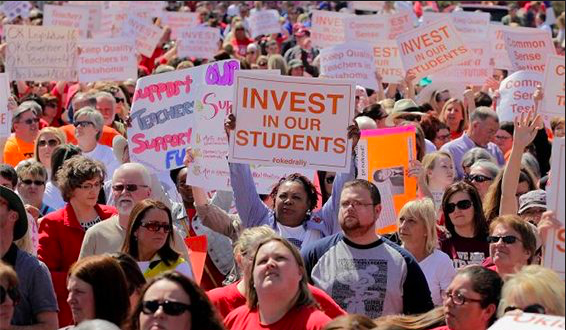This piece was first published in The New York Times.
Democratic presidential candidates have generated headlines with multibillion-dollar plans to raise teacher salaries. Kamala Harris set the bar by proposing to give public school teachers an average raise of $13,500. Bernie Sanders and Joe Biden are among the major candidates that have since followed suit, both announcing ambitious platforms to elevate the teaching profession at town hall meetings.
These lofty, well-meaning proposals are sure to pay dividends for presidential hopefuls jockeying for the endorsement of teacher unions and the votes of a growing number of Americans who support increasing teacher pay. Seventy-eight percent of the public agrees that teacher salaries are too low. Support for increasing their pay jumped to 49 percent from 36 percent, in the wake of widespread teacher strikes in the past couple of years.
But if our ultimate goal—as parents, students and voters—is to improve student outcomes, then an across-the-board raise for teachers is not the best approach, nor will it address the structural issues that have eroded the status of the teaching profession.
There is no question that effective, impactful teachers are essential for children and for the future economic competitiveness of our country at large. There is also no doubt that, despite this importance, teacher pay and prestige are on an unwelcome decline. Teacher salaries, adjusted for inflation, have actually dropped by more than 4 percent in the past decade. And according to a 2018 PDK Poll, a majority of parents now say that they wouldn’t want their child to become a public school teacher. Those parental concerns are a reflection of the financial sacrifice that often comes with a career as a public-school teacher.
[Read More: Why Reforming Teacher Evaluation Has Suceeded–and Why It Hasn’t]
Still, while higher teaching salaries will relieve financial stress, they will not necessarily make teachers better. Most educators are intrinsically motivated to work hard because of the joy they experience when students succeed. Past research has suggested higher salaries are only weakly related to performance. Unconditional raises will not create new incentives for veteran teachers to be more effective, nor will it provide the support necessary for doing so.
To be clear, it seems certain that the blanket raises being proposed would reduce teacher turnover. This is important because lower turnover minimizes the disruptive effects of teachers leaving in midyear, it keeps more experienced teachers in the classroom, and it limits the costly process of filling open positions. However, the benefits to students would most likely be modest, given that blanket raises help to retain both effective and ineffective teachers. Moreover, such raises fail to address teachers’ working conditions. Higher pay alone won’t keep strong teachers in schools with poor leadership and insufficient resources.
[Read More: A Policymaker’s Playbook for Transforming Teaching]
The largest potential value of a universal pay raise is the possibility of attracting more effective teachers into the profession. The National Education Association puts the average starting salary in public schools at less than $40,000. Data collected by the ACT organization show that high school students most commonly cited low pay as a reason for not being interested in teaching. So it seems these proposals to spend hundreds of billions of dollars on teacher raises would increase interest initially.
However, it’s a bad bet that the next Congress, still inevitably split in the Senate, and limited by its filibuster, would support a teacher pay increase with such a large price tag. Even if a Democratic president succeeded in passing legislation, uncertainty about whether federal funds would actually get through the logistics of being extended by states would limit the draw of higher pay.
A raise for the millions of current public school teachers isn’t a bad idea. But, as with many progressive hopes, it needs a bit more focus. More targeted plans with lower sticker prices—higher minimum salaries for new teachers and bonuses for teaching hard subjects and at struggling schools—would likely be more sustainable and politically effective ones.
In addition to better approaches to compensation, we also need to rethink how the teaching profession is structured. The second most commonly cited reason high school students gave for not being interested in becoming teachers is the job’s lack of career development opportunities. While other professionals earn finely tuned promotions and titles, teachers generally have few advancement paths besides salaries that are strictly based on seniority and credentials. It’s a third rail in education that no presidential candidate has dared to touch.
Attracting and retaining talented teachers will require confronting the egalitarian norms of the profession that have created resistance from its unions to differentiated pay and roles. This could look like the career ladder system proposed by education scholars Susan Moore Johnson and John Papay, in which high-performing teachers are paid substantially more when they assume the weightier tasks of improving schoolwide instruction. Promoting expert teachers to also be pedagogical leaders would naturally be an investment in retaining them.
The federal government can indeed encourage innovation and pay increases through funding increases with strings attached. And these candidates plans recognize that. But the success of teacher pay reforms will ultimately be determined at the state and local level. Sustainability, in the end, will depend instead on more directly increasing those budgets, which dwarf federal spending, as well as buy-in from local unions. We have to start in our communities.
Raising teacher pay can benefit students as well as teachers, if we do it in a strategic, well-calculated way. Providing teachers with meaningful promotions and sizable pay raises that are earned—not automatic—is a way to elevate both the teaching profession and our students success.
Matthew Kraft, research director for FutureEd, is an associate professor of education and economics at Brown University.

